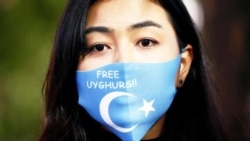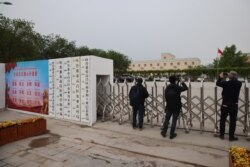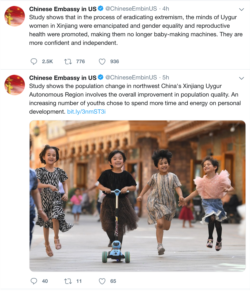On June 14, the Chinese Communist Party newspaper Global Times published a report on the latest census of China’s Xinjiang Uyghur Autonomous Region (XUAR). The article claims that the populations of Han Chinese and ethnic minorities, including indigenous Uyghurs, rose “markedly over the past decade.”
“The population of Northwest China's Xinjiang Uyghur Autonomous Region grew more than 18 percent over the past decade, the fourth fastest growth rate among the nation's 31 provincial-level regions, and the populations of the Han and ethnic minorities have increased greatly with the latter accounting for more than 57 percent of the total, regional authorities announced on Monday,” the article states.
“The announcement came after some anti-China forces and media outlets used the population data from the seventh national census, which was released on May 13, as new ingredients to cook up their old lies of ‘genocide.’”
The genocide accusation refers to China’s treatment of the Uyghur Muslims in Xinjiang, who have faced restrictions since 2016. The United Nations defines genocide as “acts committed with intent to destroy, in whole or in part, a national, ethnical, racial or religious group.”
Those acts include “imposing measures intended to prevent births within the group” and “causing serious bodily or mental harm to members of the group.” Human rights watchdogs and other critics say that China’s mass detentions of Uyghurs and its measures to reduce their birthrate constitute genocide.
The Global Times article cites as sources a Xinjiang regional statistics bureau communique that changes earlier population estimates and an unnamed officials at a news conference:
“The population data for the Uyghur ethnic group in 2018 published by Xinjiang, which was calculated by some research institutes based on relevant materials and sampling data, had some deviations and therefore needs revising according to the census results, the official explained, stressing that both Xinjiang's total population and Uyghur's population have sustained steady growth.”
The article claims that the Han population grew by 24.86 percent, while the Uyghur population grew by 16.2 percent, and attributes the Han population’s rapid growth to a “large influx of migrant workers,” “sustained social stability” and “rapid economic development.”
The article slams an Australian Strategic Policy Institute (ASPI) report, which previously claimed that a sharp drop in official birthrates in Xinjiang between 2017 and 2019 was evidence of a policy aimed at “lowering the indigenous birthrate.”
According to Global Times, the birthrate dropped because of economic development and urbanization:
“In recent years, as Xinjiang has deepened its poverty alleviation efforts, the production and living conditions in impoverished areas in southern Xinjiang have improved continuously; urbanization has significantly accelerated and the urban population has continued to increase; and the education level and cultural quality of people of all ethnicities improved substantially … Accordingly, people's attitude toward childbearing and upbringing has changed, with more and more people of all ethnicities voluntarily choosing to marry late and to have fewer children.”
The article omits mention of the ongoing detention of Uyghurs. Chinese authorities initially denied the existence of detention facilities, but when evidence of their existence became too obvious to ignore, officials shifted to calling them educational institutions or “job-training centers.” Witnesses, however, have described prison-like facilities in which inmates’ Muslim faith is denigrated and women have been subjected to rape and torture.
“Beginning in April 2017, Chinese Communist Party authorities in Xinjiang launched a series of ‘strike-hard’ campaigns against ‘illegal births’ with the explicit aim to ‘reduce and stabilize fertility at a moderate level’ and decrease the birth-rate in southern Xinjiang by at least 4 children per thousand people from 2016 levels,” the ASPI report states.
The Global Times article touches on changes in family planning policy in Xinjiang, claiming that in 2017, all ethnic groups in the region were subject to a new policy that allowed two children for urban families and three for rural families.
The ASPI report, however, says the family planning laws are being applied in a discriminatory fashion:
“In 2017, the Chinese government’s approach to birth control among minority nationalities shifted from ‘reward and encourage’ towards a more coercive and intrusive policing of reproduction processes,” the report states. “Hefty fines, disciplinary punishment, extrajudicial internment, or the threat of internment were introduced for any ‘illegal births.’ Family-planning officials in Xinjiang were told to carry out ‘early detection and early disposal of pregnant women found in violation of policy.’”
The Global Times piece is silent on reports of forced sterilization of Uyghur women. France 24 reported that these measures include state-imposed quotas on sterilizations and IUD use. AFP talked to a Uyghur woman, Qelbinur Sedik, who escaped China to Europe. She said Chinese authorities had repeatedly forced her to undergo IUD insertion even though she was 50 years old and past child-bearing age. When she complained of severe bleeding and pain after those attempts, she was forced to undergo sterilization or face legal repercussions. Sedik told AFP that what she experienced was “systematic.”
In a now-deleted tweet from January, the Chinese Embassy in Washington, D.C., appeared to defend aggressive birth control by suggesting that Uyghur women had previously been treated as “baby-making machines.”
“Study shows that in the process of eradicating extremism, the minds of Uyghur women in Xinjiang were emancipated, and gender equality and reproductive health were promoted, making them no longer baby-making machines. They are more confident and independent,” the tweet read.
Polygraph.info found this claim to be false, given the overwhelming evidence that Uyghur families in China were forced to accept long-term birth control and undergo sterilization and abortion.
In October 2020 joint statement at the United Nations, diplomats from 39 countries condemned human rights abuses against Uyghurs and Tibetans. In regards to the Uyghurs, German ambassador Christoph Heugsen cited the government’s policy of “forced birth control, including sterilization.” The diplomats also demanded that Chinese authorities close the detention facilities. The United States, U.K., Canada, and European Union have imposed sanctions on several Chinese officials connected to Xinjiang.
An investigation by BuzzFeed into China’s network of the detention centers in 2020 found nearly 270 new high-security installations, some capable of holding “tens of thousands” of inmates. BuzzFeed discovered evidence of the facilities in satellite imagery, leaked Chinese official documents and accounts from witnesses and former inmates.
China has defended its policies in Xinjiang as necessary to prevent extremism and has disputed estimates embraced by the United Nations and others that more than 1 million have been detained.








